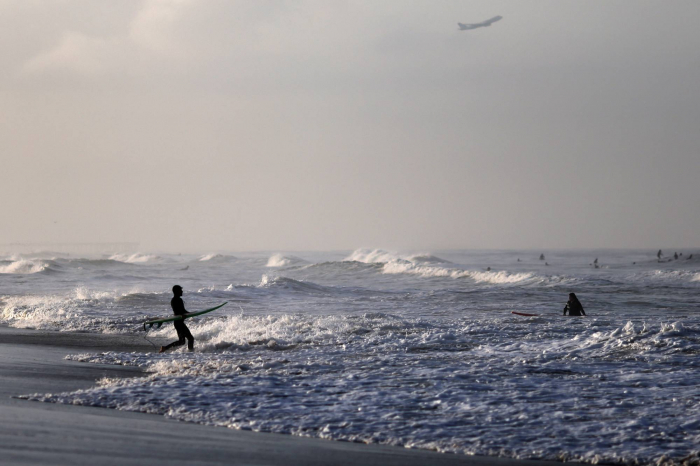Climate change has wrought major changes to ocean stability faster than previously thought, according to a study published Wednesday, raising alarms over its role as a global thermostat and the marine life it supports.
The research published in the journal Nature looked at 50 years of data and followed the way in which surface water "decouples" from the deeper ocean.
Climate change has disrupted ocean mixing, a process that helps store away most of the world's excess heat and a significant proportion of CO2.
Water on the surface is warmer – and therefore less dense – than the water below, a contrast that is intensified by climate change.
Global warming is also causing massive amounts of fresh water to flush into the seas from melting ice sheets and glaciers, lowering the salinity of the upper layer and further reducing its density.
This increasing contrast between the density of the ocean layers makes mixing harder, so oxygen, heat and carbon are all less able to penetrate to the deep seas.
"Similar to a layer of water on top of oil, the surface waters in contact with the atmosphere mix less efficiently with the underlying ocean," said lead author Jean-Baptiste Sallee of Sorbonne University and France's CNRS national scientific research center.
He said while scientists were aware that this process was under way, "we here show that this change has occurred at a rate much quicker than previously thought: more than six times quicker."
The report used global temperature and salinity observations obtained between 1970 and 2018 – including those from electronically tracked marine mammals – with a focus on the summer months, which have more data.
It said that the barrier layer separating the ocean surface and the deep layers had strengthened world-wide – measured by the contrast in density – at a much larger rate than previously thought.
Researchers also found that, contrary to their expectations, winds strengthened by climate change had also acted to deepen the ocean surface layer by five to 10 metres per decade over the last half century.
A significant number of marine animals live in this surface layer, with a food web that is reliant on phytoplankton.
But as the winds increase, the phytoplankton are churned deeper, away from the light that helps them grow, potentially disrupting the broader food web.
These are "not small changes that only some experts care about," Sallee told AFP.
"They represent a fundamental change in the underlying structure of our oceans. Way more pronounced than what we thought until now."
Profound and troubling
The oceans play a crucial role in mitigating the effects of climate change by absorbing around a quarter of man-made CO2 and soaking up more than 90 percent of the heat generated by greenhouse gases, according to the Intergovernmental Panel for Climate Change (IPCC).
"But by stabilizing, the ocean's role to buffer climate change is made harder as it is made more difficult for the ocean to absorb these vast amounts of heat and carbon," Sallee said.
Scientists are increasingly sounding the alarm over the potential implications of warming on our oceans.
In 2019, research published in the US Proceedings of the National Academy of Sciences calculated that climate change would empty the ocean of nearly a fifth of all living creatures, measured by mass, by the end of the century.
Climate scientist Michael Mann warned in September that findings from a study he co-authored in Nature Climate Change – which suggested global ocean stratification had increased by 5.3 percent from 1960 to 2018 – had "profound and troubling" implications.
These included potentially more intense hurricanes driven by warming ocean surfaces.
And in February, research in Nature Geoscience found that the northern extension of the Gulf stream – the vast, heat carrying ocean current that influences weather in Europe and sea levels in the US – was its weakest in over a thousand years, likely because of climate change.
They said increased rainfall and melting of the Greenland ice sheet have increased the freshwater in the upper ocean, disrupting the normal cycle that carries warm, salty surface water northwards from the equator and sends low-salinity deep water back southwards.
Agence France-Presse
More about: #globalwarming
















































